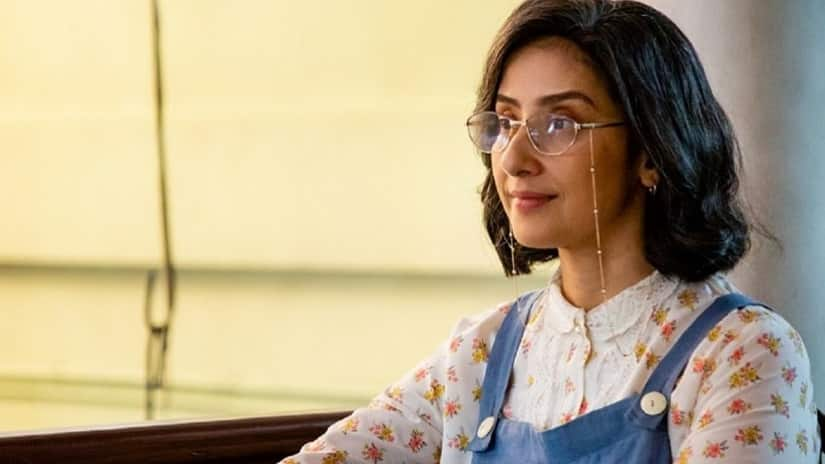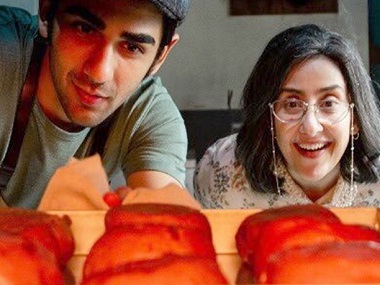Neeraj Udhwani’s slice-of-life film Maska is slated to release this Friday on 27 March. The story revolves around a young Parsi man Rumi Irani (Prit Kamani), whose single mother Diana (Manisha Koirala) expects him to follow in his late father’s footsteps and take over his Irani cafe business in South Mumbai. But thanks to his girlfriend Mallika Chopra (Nikita Dutta), he wants to make it big as a actor hero in Bollywood. Ahead of the release, the cast, including Manisha, Prit, Nikita, Shirley Setia, and Jaaved Jaaferi, open up on how they got into the skin of their respective characters, and how they blended into the Parsi culture. *** Twenty-nine years ago, Manisha Koirala made her Bollywood debut with Subhash Ghai’s 1991 film Saudagar. Ever since then, she has been best known for her extremely emotive face, that is capable of telling the entire story of the film just through its depiction of a wide range of moods and feelings. But in Maska, she could not rely on that crutch since her face was covered with long salt-and-pepper locks, spectacles, and a little bit of makeup to make her look older. [caption id=“attachment_8183141” align=“alignnone” width=“825”]
 Manisha Koirala in a still from Maska[/caption] “Haha! Yes, there weren’t too many closeup shots so my face couldn’t help much. But I had a great support system which helped me act through other tools like body language and diction,” says Manisha. When I say her experiments were immensely successful as she looked like the Parsi neighbourhood aunty I once had, she laughs out loud. “Yay! That means I got it right. I had an acting coach in Ritesh, and a diction coach in Mona, who’s a Parsi herself. She took me to these Parsi cafes, the fire temples, and Parsi colonies. I saw a few Parsi movies as well. All this research, the help of my coaches, and the freedom by my director allowed me to to do full justice to her well-rounded character on paper.” Three decades into the business, Manisha is in the midst of her second phase in the entertainment business: with projects like Dibakar Banerjee’s short in Lust Stories, Maska, and Dibakar’s next on Netflix, Freedom. “I’m really enjoying working in the digital space. It is so well-planned and elaborate. In Freedom, I have a longer arc, and I’m grateful to collaborate with Dibakar again. I can’t say much about it right now but as an actor, it has checked a long-pending box on my checklist.” Since the industry has turned on its head since Manisha broke out, it is a completely different space for her. But she denies that seeking help from acting coaches does not bruise her ego as a seasoned actor in any way. “More than learning anything new, these coaches help me to unlearn everything I’ve gathered for so many years. The idea is to let go of what’s not required for the role, and imbibe anything new that’s needed. I’m a Nepali who’s never played a Parsi before. Naturally, I had to pick up a lot to play her accurately. But I had a ball playing Dina Irani. She’s a mad woman, so wacky! She’s comfortable with hurling an abuse at the drop of a hat.” Along with playing a Parsi woman, Manisha had to also imbibe the shades of a single parent. “All her angst comes from the fact that she’s a mother who had to go through whatever she did all alone. She had to raise a son while running her husband’s Irani cafe. She knows she’s not a great cook, and that frustrates her even more. She discovers her son has inherited his father’s cooking skills, and thus has dreams of him taking over the cafe. So when he reveals to her he wants to be an actor instead, it comes as a rude shock to her.” *** Jaaved Jaaferi, who also essays a pivotal character in the film, says playing a Parsi came naturally to him. “I grew up in Bandra, which was very multicultural. I had a Parsi girl tieing rakhi to me, two Hindu girls tieing rakhi to me, a Christian best friend, and a Sardar best friend among other close relations. I got that from my father (veteran actor Jagdeep), who was mentored by directors like Bimal Roy, Guru Dutt, K Asif, V Shantaram, and Mehboob Khan. He worked with them as a child. He didn’t have a father as he passed away before he came to Mumbai after Partition, when he was just nine years old. Now that multiculturalism is going away (referring to the
Citizenship Amendement Act and National Register of Citizens), I just want to say man, this isn’t what I grew up with.” He adds his point of reference were his friends who operated a Parsi cafe. “They were Parsi Muslims, not Zoroastrians to be specific. But the core culture was the same since they both migrated from Iran, before Zoroastrians adopted the Gujarati culture,” says Jaaved. *** How the Zoroastrians embraced the Gujarati culture is explained by an interesting historical anecdote, narrated by Prit Kamani, the lead actor of the film. “When they entered India through Gujarat, they asked a king there to give them space in his land to settle down. But the king argued his land didn’t have space for any more people. When they didn’t get what he was trying to say, he got a glass and filled it with water, and explained the glass was his land and it didn’t have any space left. So the Parsis responded by mixing sugar into the water. They said they’re like the sugar, who will blend into the Gujaratis and even make them sweeter.” Nikita Dutta claims it was Parsi food that marked the beginning of her association with the culture back in school. “I had a lot of Parsis in my school. I had a Parsi friend who lived with her granny, and would bring these interesting Parsi delicacies in her lunchbox. We also had a Parsi cafe close to our school, and would often visit there to get a taste of the Parsi culture.” [caption id=“attachment_8183191” align=“alignnone” width=“825”]
 Prit Kamani, Manisha Koirala, Shirley Setia, and Nikita Dutta in a promotional still of Maska[/caption] Shirley Setia, a social media music sensation who will make her acting debut with Maska, claims unlike most of her co-stars, she did not grow up amidst Parsis. She grew up in Australia, and moved to Mumbai only recently in order to pursue her dream of becoming an actor. “In the film, I play a Parsi girl who has a blog where she loves to document stories from the Parsi community. So I had to shirk my Australian accent while speaking in Hindi. What really helped was when we visited a Parsi cafe in town (South Mumbai). I talked to the visitors there, who just like the Parsis in my film, had been visiting the cafe for years. It had become so integrated with their daily lives. That really helped me to realise how indispensable these cafes are to the Parsi community.” With the Irani cafes rapidly depleting from the culture of Mumbai, a film like Maska holds even greater significance. It serves the same purpose as Shirley’s character in the film - to keep the Parsi culture up and running. All images from Twitter.
Maska, in which Manisha Koirala plays a Parsi woman from South Mumbai, will release on Netflix on 27 March.
Advertisement
End of Article
Written by Devansh Sharma
Twitter handle - @inkedinwhite see more


)
)
)
)
)
)
)
)
)



